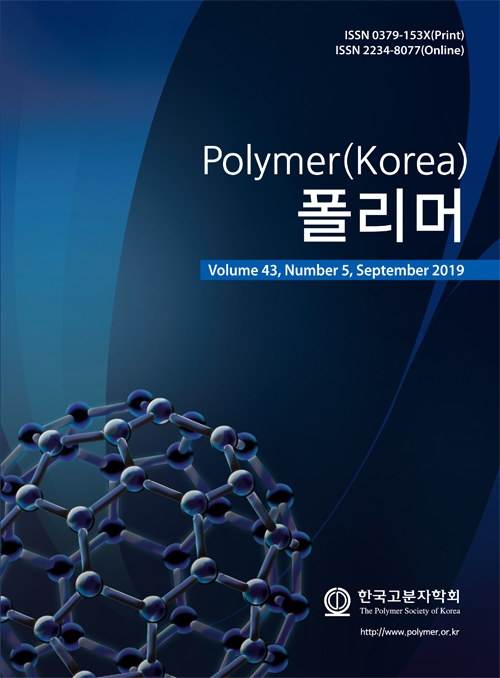- Study on Mechanical Properties and Viscoelastic Properties of Bio-polyurethanes
*School of Energy, Materials and Chemical Engineering, Korea University of Technology and Education, Cheonan, Chungnam 31253, Korea
**Research Center of Eco-friendly & High Performance Chemical Materials, Cheonan, Chungnam 31253, Korea- 바이오 폴리우레탄의 물성 및 점탄성에 대한 연구
*한국기술교육대학교 에너지, 신소재, 화학공학부, **친환경고성능화학소재연구소
The bio-polyester polyol has been prepared by azelaic acid and 1,3-propanediol(1,3-PD) from biomass with esterification synthesis method, and MDI (4,4'-methylenebis (phenyl isocyanate)), H12MDI and IPDI (isophorone diisocyanate) were used as isocyanates, 1,4-butanediol(1,4-BD) was used as chain extender. It also had been set the general polyurethane with SS-106 polyol, and bio-polyurethane without chain extender as control groups. The viscoelastic behaviors of the bio-polyurethanes were explored using a rubber processing analyzer (RPA) in the mode of strain sweep. And the mechanical properties (tensile strength, hardness value, resilience, abrasion resistance) were characterized by UTM, shore A tester, ball rebound and taber abrasion resistance tester. From the results above, the bio-polyurethane which synthesized in this research with bio-polyester polyol showed better abrasion resistance, elongation rate and viscoelastic properties compared to the general polyurethane material as elastomers.
바이오매스 유래의 azelaic acid, 1,3-propanediol(1,3-PD)를 사용하여 바이오 폴리에스터 폴리올을 합성하였다. 합성한 폴리에스터 폴리올에 MDI(4,4'-methylenebis (phenyl isocyanate)), H12MDI and IPDI(isophorone diisocyanate)와 사슬연장제로 1,4-butanediol(1,4-BD)을 넣고 바이오 폴리우레탄을 합성하였다. 그리고 사슬연장제 없이 poly(1,4-butylene adipate)를 폴리올로 사용하여 일반 폴리우레탄을 합성하였다. 고분자 가공분석기(RPA)의 변형 스윕(strain sweep) 기능을 사용하여 제조된 폴리우레탄의 점탄성을 조사하였다. UTM, shore A, ball rebound 및 taber기계를 사용하여 폴리우레탄의 인장강도, 경도, 반발탄성 및 내마모성 측정을 통하여 기계적 물성을 확인하였다. 제조된 바이오 폴리우레탄은 일반 폴리우레탄보다 더 좋은 점탄성, 내마모성 및 신장률(elongation rate)을 보였다.
Keywords: bio-polyurethane, bio-polyester polyol, viscoelastic properties, abrasion resistance, mechanical properties
- Polymer(Korea) 폴리머
- Frequency : Bimonthly(odd)
ISSN 0379-153X(Print)
ISSN 2234-8077(Online)
Abbr. Polym. Korea - 2023 Impact Factor : 0.4
- Indexed in SCIE
 This Article
This Article
-
2019; 43(5): 674-679
Published online Sep 25, 2019
- 10.7317/pk.2019.43.5.674
- Received on Mar 6, 2019
- Revised on May 20, 2019
- Accepted on Jul 10, 2019
 Correspondence to
Correspondence to
- Ur Ryong Cho
-
*School of Energy, Materials and Chemical Engineering, Korea University of Technology and Education, Cheonan, Chungnam 31253, Korea
**Research Center of Eco-friendly & High Performance Chemical Materials, Cheonan, Chungnam 31253, Korea - E-mail: urcho@koreatech.ac.kr









 Copyright(c) The Polymer Society of Korea. All right reserved.
Copyright(c) The Polymer Society of Korea. All right reserved.